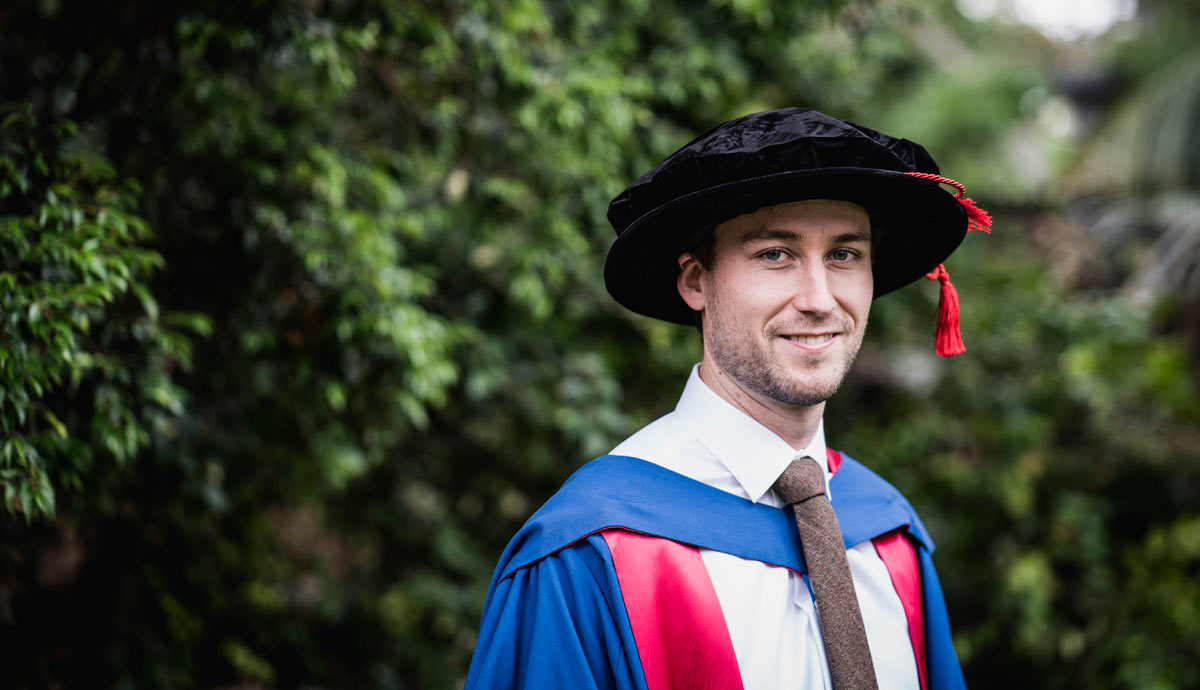December 12, 2018
Engineering graduate rides a sound wave into Facebook
Research reveals how to create personal sound in public spaces, without headphones.
Personal sound in a public space, without using noise-cancelling headphones. It sounds like a complete contradiction but that’s exactly what computer engineering graduate Jacob Donley managed to show was possible during his PhD at the University of Wollongong (UOW).
The 26-year-old Caringbah-born computer engineer flew back into Australia this week, taking time out from his job with Facebook Research, to attend his PhD graduation from the Faculty of Engineering and Information Sciences.
His thesis, Reproduction of Personal Sound in Shared Environments, explored a growing area of interest in the technology world: the use of audio or sound to control where in a room certain sounds are heard.
Jacob succinctly describes his work – conceptually simple but a theoretical and technical complexity beyond basic comprehension – in a 2016 article for The Conversation.
He explains how controlling the direction of sound waves, particularly where waves from different sound sources meet, can nullify or amplify the sound, similar to the trick used in noise-cancelling headphones, which detect an external sound and produce or emit a sound wave to cancel the interference.
During his PhD he demonstrated the concept by setting up a system of loudspeakers in a room, where each speaker is tuned carefully to produce zones of sound or silence.
The ultimate, a @Genelec #soundbar #sound #music #audio #loudspeakers #media #multimedia #cinema #office #anechoic @uow @uoweis @UOWGC pic.twitter.com/9BEZXTHjmZ
— Jacob Donley (@_JacobDonley) April 23, 2017
“One of the things that really caught my attention was the fact that you could create these different pockets of sound that were separate,” Jacob said.
“You could use this to improve communication in places where it may be more difficult, such as in restaurants or anywhere that busy, maybe even stadiums or markets or wherever you can put up a set of loudspeakers and control sound over the space.
“If you think about a restaurant, you could be sitting at the table and you have your laptop out having a video chat conversation without anyone else being able to hear and you wouldn't need to wear headphones, you wouldn't need to have your own physical barrier or glass walls around you.
"The system in the room would provide you with that audio barrier.”
But rather than imagining a room full of artificial noises, Jacob stresses that the idea is to mimic the natural environment.
“Human perception in these systems is critical. We're building them for us.
"A lot of these systems will have us as end users and understanding how people perceive sound is a critical part of designing and building them.”
His fascination with electronics and computer engineering started in primary school through his teachers and continued into high school where basic programming was part of the curriculum.
“In Year 4 or 5 one of my teachers brought in some electronic gizmo, like a printed circuit board, they’d built themselves and that kind of got me really fascinated with electronics in general.
“During high school my dad used to have a lot of computer magazines and I'd go through and I'd pick out some of the programs in the CDs that came with them and one day I picked up this CD and opened a program and it was a text editor.
“It turned out you could write your own programs and I worked out that you could then automate and build things to get a computer to do all the work for you, which I thought was pretty fascinating, and it kind of went from there.”
He had a family connection to Wollongong so UOW was a natural choice for his undergraduate degree.
Jacob recalls his early entry interview where he said he wanted to study something that combined electronics and programming.
“They said to me, ‘well computer engineering is exactly that’, and that was how I got into that degree.”
He was recruited by Facebook to continue his work in audio with the research and development arm of the social media giant, Facebook Reality Labs, where he’s part of a team developing augmented reality / virtual reality technology (AR / VR).
Non-disclosure agreements that lock-down Facebook’s intellectual property means he can’t go into detail about projects he’s involved with, except that he’s still in audio for AR / VR.
It is, in Jacob’s own words, the “big league” of the tech world.
“I really didn't realise how big league it was but some of the underlying ideas, concepts, the math and physics for the acoustics and everything that I work on has some very interesting applications.”
He credits his undergraduate degree and PhD for providing the foundations that have enabled his learning to continue on a steep upward trajectory with Facebook.
“It gave me the launch pad to do things well, to do things properly and that good, basic knowledge has set me up at Facebook where I understand how research should be done properly and I'm learning how my skills can translate across several different areas within my own area of expertise.”
His advice for other prospective tech students is simple: “Don't be afraid to ask questions. Never stop learning, never stop questioning.”
